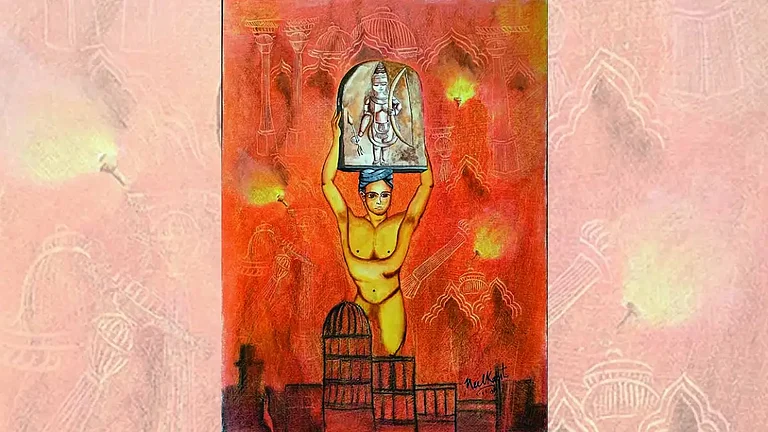The Ram-Raavan yuddh (battle) had ended. The mighty Lord of Lanka had fallen to the all-powerful Brahmastra. He had slipped to the ground from his chariot and lay amidst the blood and gore of the battlefield, just like any other ordinary soldier. Mandodari and Raavan’s other wives were grieving over his death and Vibhishan, with great effort, managed to persuade them to return to the palace.
The Wisdom Of Raavan
As Raavan lay dying, Ram told Lakshman to learn from his defeats. Ram hailed him a great scholar and said there is no enemy or enmity when the war is over

Ram, with Lakshman by his side, watched the scene dispassionately from a distance. He knew that the life force had not yet separated from Raavan’s prone form, even though he had not once opened his eyes to look at Mandodari and others. He nudged Lakshman to go and seek knowledge and wisdom from Lankadheesh. “He is our enemy!” exclaimed Lakshman, clearly unwilling to do his bhrata’s (brother’s) bidding. “When the war is over, there is neither enemy nor enmity. And do not forget, Raavan is a great scholar, a great Shiva bhakta and also a great king and administrator,” said Ram.
Lakshman returned to report that Raavan had not responded to his questions. “Ah! That is because you stood near his head. When you are seeking knowledge, he is the ‘Guru’ and you are the ‘sishya’ (disciple). A sishya’s place is at the Guru’s feet,” Ram said and led his brother back to the dying Raavan. Kneeling at Raavan’s feet and with utmost respect, Ram said, “O Lord of Lanka, you abducted my wife. It was a terrible crime and I had to punish you. Now, that is behind us and you are no more my enemy. I bow to you and request you to share your wisdom with me. Your wisdom is too valuable to be lost to the world after you.”
The vanquished Raavan obliged, and there ensued a series of life lessons that have stood the test of time and have relevance to date.
Raavan had learnt the four Vedas directly from Brahma and is considered one of the very few people who has lived through a full cycle of the four yugas.
In the Mahabharata, before the Kurukshetra war began, Arjun developed cold feet at the prospect of having to kill his own kith and kin. Krishna steered him to action by propounding the Bhagavad Gita. Is there a similar lesson that is revealed through the Ram-Raavan yuddh in the Ramayana? There is, actually! But for some inexplicable reason, not many people know it. Unlike several other upadeshas (teachings) that came to be known as Gita (Uddhava Gita, Vashishtha Gita, Ashtavakra Gita, Ganapati Gita…to name just a few), the essence of the epic exchange between Ram and Raavan in the Ramayana failed to attain this nomenclature. At a personal level, I would have no hesitation in calling it the Raavan Gita, even though it might offend some.
It is not a very long lesson that Raavan imparted to Ram, but his words still hold good for the world today. Do we not live in an uncertain world, with innumerable types of temptations, insatiable hunger for success and possessions, and lack of trust on account of mindless competition?
Everything Raavan said is based only on his own life and experience, and can be segregated into two sections. One deals with do’s, don’ts and cautions, and the other is about his regrets and reflections on life. Somewhere along the way, Raavan begins to feel that he has known Ram long before now. He is intrigued when Ram addresses him as “Jaya”, and is miffed at the sense of peace and calm that enveloped him on hearing Ram’s voice. This feeling of complete comfort peaked whenever Ram addressed him as “Jaya”. In his enfeebled state, when he needed all his energy just to stay focused on the ongoing conversation, he was unable to fathom the reason.
Raavan closed his eyes for a moment before starting to speak. Ram realised that the dying demon king had recalibrated the movements of the nine planets to slow down time and delay the moment of his passing. Raavan had learnt the four Vedas directly from Brahma and is considered one of the very few people who has lived through a full cycle of the four yugas (ages). Raavan opened his eyes, smiled at his erstwhile opponent and slayer and called him a “worthy disciple” fit to carry his wisdom to the world.
“O Rama, my life on earth will end soon, but as you have long years to live, I will point out the various pitfalls that you must guard against. Be aware and lead a glorious life.
“Do not think you will always be a winner, irrespective of your knowledge, skills and capabilities...Be prepared for defeats, failures and losses.”
“Things that are bad for you attract you immensely and you succumb easily to their charms. In the process, you tend to ignore and bypass what is actually good for you. In fact, even when you reach a stage when you cannot deny the intrinsic goodness of these things, you exhibit powerful and convincing excuses to justify procrastination…In my own case, I was so impatient to possess Sita that I avoided meeting you. I just needed to pause and consider the situation to understand what was good for me,” Raavan smiled wanly and offered apologies for this deed. He drew a laboured breath and continued: “Do not invite enmity with your charioteer, your gatekeeper, your cook and your brother. Remember that they can harm you easily at any time.”
Raavan’s words, spoken thousands of years ago, seem tailor-made for the 21st century. Consider the fatal attraction of social media, artificial intelligence (AI) and perverse minds working overtime to find newer and newer methods to con people. The glitz and glamour purveyed through the Internet has taken greed to quite another level. Causing harm to anyone to feed one’s greed has become commonplace. Interestingly, Raavan included ‘brother’ in the list of people to guard against, possibly because of his own experience with Vibhishan, the brother who joined enemy ranks.
Other significant points Raavan made that are relevant to us include: “Do not think you will always be a winner, irrespective of your knowledge, skills and capabilities. Your winning streak will end sooner or later. Be prepared for defeats, failures and losses; trust the minister who criticises you; never underestimate your enemy; do not think that your actions will pass you by without delivering a suitable and befitting reaction; hate per se is not a negative emotion.”
Again, there can be no doubt about the relevance of this advice for our time. Everyone wants to succeed in everything at all times—success at any cost is the prevalent motto; intolerance to criticism is rampant and dealing with defeats and failures is a lesson not learnt by the vast majority.
As Raavan fell silent, Ram felt impelled to draw him out: “Is there anything you regret in life, Dashagreeva?”
He opened his eyes with an effort and nodded. “Birth is the truest truth about one’s existence and death equals it in truth. I have committed several sins in my life, but I could not have omitted to commit these sins as they were destined to happen. I acquired a lot of knowledge. It was my pride. But I am sad that I neither lived as a student nor as a teacher. Knowledge is hungry for hungry minds. If you don’t share it, it will consume you and your existence.
“I have lived long; seen nature. Seen everything getting washed away in pralaya (flood) and seen life regenerate from dead wood. It is not possible to fully understand or predict nature, not even for gods. The only law that holds good and prevails on all other laws is the law of nature. For all my experience, even I cannot unravel why I did what I did. Where and how did I get the courage to do them? But I know…It was my nature that made me do them. I knew I had to be a part of this ‘dharma-yuddh’ so that people’s faith in dharma stands firm.
“I am happy that my circle of life is nearing completion. Happy that my life is tangled with yours. Really happy that death is close by. Death is peace; death is rest. We all live to achieve that end-point—death. The purpose of life is to give meaning to death.”
“Are you afraid to die, Jaya?” Ram asked in a soft voice.
Raavan shook his head, but his thoughts had drifted. With eyes barely open and voice barely audible, he seemed gripped by a frenzy. “Who…who are you, Rama…who are you? You are not the mortal who used the Brahmastra on me. I know you...I know…”
“Yes, you are right. I am here to take you, Jaya. Do you remember the four Sanat Kumaras who cursed you and Vijaya to life on earth? You chose three janmas (births) as Vishnu-dweshis (haters) over seven janmas as Vishnu-bhaktas (devotees). This is your second birth on earth, Kumbhakarn being Vijaya. In the first janma, you were Hiranyakashipu and Vijaya was Hiranyaksha,” Ram said in a gentle voice.
“You are Srihari…Srihari of Vaikuntha. Come on earth as manushya (man) to finish my pride.” With Herculean effort, Raavan mustered all his faculties and even managed a smile. “I am the winner. I truly am…I made you come down to my plane; did not allow you to step into my territory while I am alive. Yet, I am going to Vaikuntha when you are not even there,” Raavan fell silent.
(Views expressed are personal)
Radha Viswanath is an author and a journalist


























